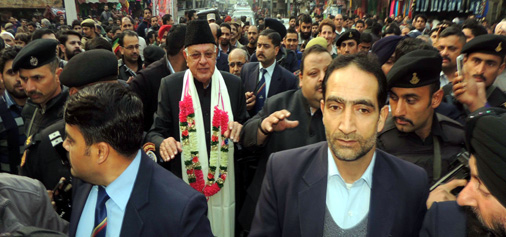Sanjeev Pargal
JAMMU, Jan 15: National Conference president and former Chief Minister Dr Farooq Abdullah said today that releasing Jaish-e-Mohammad (JeM) chief Maulana Masood Azhar from Kot Bhalwal jail in 1999 in the wake of Kandahar hijacking was the “biggest mistake’’ the NDA Government had committed and made it clear that he was deadly against it (the release).
Speaking to reporters at Kanak Mandi after undertaking tour of business markets of Jammu City on the invitation of the traders to celebrate Lohri and Makkar Sankranti with them, Farooq said he had strongly opposed release of Masood Azhar in lieu of safe release of Air India passengers held hostage by the militants at Kandahar in Afghanistan.
“I had made it known to the Government of India at that time when I was Chief Minister of the State that release of Masood Azhar was not good. My apprehensions have come true as the Indian Government has now itself stated that Azhar was mastermind of January 2 attack at Pathankot airbase,’’ Dr Abdullah, who was accompanied by National Conference provincial president, Devender Singh Rana in his tour of the City, said.
Replying to a question on whether the Government of India should seek custody of Masood Azhar, who has reportedly been detained in Pakistan along with his brother and other Jaish activists, Farooq said: “it was up to the Government of India to decide whether they seek return of Masood Azhar or not’’.
However, he said, his apprehensions on Masood Azhar in 1999 have come true after Pathankot airbase attack.
Azhar Masood had been arrested in Kashmir and was detained in Kot Bhalwal Central Jail. He was released along with two other dreaded militants by the then NDA Government headed by Atal Bihari Vajpayee to get Air India passengers released safely, who had been held hostage by the militants in 1999 seeking release of Azhar and others.
In his recent book, former RAW chief AS Dulat had also made disclosures that Farooq Abdullah, who was Chief Minister in Jammu and Kashmir from 1996 to 2002, had opposed release of Masood Azhar.
Replying to another question, Dr Farooq Abdullah welcomed the visit of Prime Minister Narendra Modi to Lahore, Pakistan on way back to New Delhi from Russia and Afghanistan and stressed that talks between India and Pakistan should be taken forward.
“There is no alternate to talks. India and Pakistan must talk to resolve their issues,’’ he said and hoped that the two countries would go ahead with the dialogue.
Only yesterday, India had re-scheduled Foreign Secretary level talks with Pakistan but didn’t cancel them. The talks were scheduled to be held today (January 15) in Islamabad.
Dr Abdullah wished the people prosperous, joyous and peaceful 2016 with a hope that such auspicious occasions will prove as harbinger of amity, tranquility and harmony in the society.
It took him two hours to pass through the busy heritage market which otherwise is just a five-minute walk. No sooner, he made an impromptu appearance in the famous heritage Raghunath Bazar, several shopkeepers alighted from their shops and shook hands with him.
Dr Abdullah waved at the people assembled on the pavements, wished pilgrims’ blissful pilgrimage and sat for a while at the business establishments of known acquaintances. He also distributed sweets among the people.
Being amidst the people has been decades old pastime of the former Chief Minister, who makes it a point to visit the city’s landmark whenever in Jammu. He interacted with pilgrim tourists belonging to various States and enquired about their experience with the time-tested hospitality of the city people. He hoped that the incoming visitors will carry cherished memories of their visit to Jammu and Mata Vaishno Devi and return with a message of peace from the State of Jammu and Kashmir, known for its unity in diversity.
Many people apprised NC president about various problems and sought his intervention in getting them addressed.


